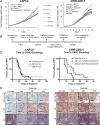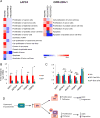Selective Glucocorticoid Receptor Modulators (SGRMs) Delay Castrate-Resistant Prostate Cancer Growth
- PMID: 28428441
- PMCID: PMC5544558
- DOI: 10.1158/1535-7163.MCT-16-0923
Selective Glucocorticoid Receptor Modulators (SGRMs) Delay Castrate-Resistant Prostate Cancer Growth
Abstract
Increased glucocorticoid receptor (GR) expression and activity following androgen blockade can contribute to castration-resistant prostate cancer (CRPC) progression. Therefore, we hypothesized that GR antagonism will have therapeutic benefit in CRPC. However, the FDA-approved nonselective, steroidal GR antagonist, mifepristone, lacks GR specificity, reducing its therapeutic potential. Here, we report that two novel nonsteroidal and highly selective GR modulators (SGRM), CORT118335 and CORT108297, have the ability to block GR activity in prostate cancer and slow CRPC progression. In contrast to mifepristone, these novel SGRMs did not affect androgen receptor (AR) signaling, but potently inhibited GR transcriptional activity. Importantly, SGRMs decreased GR-mediated tumor cell viability following AR blockade. In vivo, SGRMs significantly inhibited CRPC progression in high GR-expressing, but not in low GR-expressing xenograft models. Transcriptome analysis following AR blockade and GR activation revealed that these SGRMs block GR-mediated proliferative gene expression pathways. Furthermore, GR-regulated proliferation-associated genes AKAP12, FKBP5, SGK1, CEBPD, and ZBTB16 are inhibited by CORT108297 treatment in vivo Together, these data suggest that GR-selective nonsteroidal SGRMs potently inhibit GR activity and prostate cancer growth despite AR pathway inhibition, demonstrating the therapeutic potential of SGRMs in GR-expressing CRPC. Mol Cancer Ther; 16(8); 1680-92. ©2017 AACR.
©2017 American Association for Cancer Research.
Figures





Similar articles
-
Glucocorticoid Receptor (GR) Activation Is Associated with Increased cAMP/PKA Signaling in Castration-Resistant Prostate Cancer.Mol Cancer Ther. 2024 Apr 2;23(4):552-563. doi: 10.1158/1535-7163.MCT-22-0479. Mol Cancer Ther. 2024. PMID: 38030378 Free PMC article.
-
Glucocorticoid receptor activity contributes to resistance to androgen-targeted therapy in prostate cancer.Horm Cancer. 2014 Apr;5(2):72-89. doi: 10.1007/s12672-014-0173-2. Epub 2014 Mar 11. Horm Cancer. 2014. PMID: 24615402 Free PMC article.
-
A TBX2-driven signaling switch from androgen receptor to glucocorticoid receptor confers therapeutic resistance in prostate cancer.Oncogene. 2025 Apr;44(13):877-892. doi: 10.1038/s41388-024-03252-5. Epub 2024 Dec 20. Oncogene. 2025. PMID: 39702503 Free PMC article.
-
Interference with the androgen receptor protein stability in therapy-resistant prostate cancer.Int J Cancer. 2019 Apr 15;144(8):1775-1779. doi: 10.1002/ijc.31818. Epub 2018 Nov 4. Int J Cancer. 2019. PMID: 30125354 Review.
-
Enzalutamide: targeting the androgen signalling pathway in metastatic castration-resistant prostate cancer.BJU Int. 2016 Feb;117(2):215-25. doi: 10.1111/bju.13123. Epub 2015 Jun 6. BJU Int. 2016. PMID: 25818596 Free PMC article. Review.
Cited by
-
Castration-Resistant Prostate Cancer Refractory to Second-Generation Androgen Receptor Axis-Targeted Agents: Opportunities and Challenges.Cancers (Basel). 2018 Sep 21;10(10):345. doi: 10.3390/cancers10100345. Cancers (Basel). 2018. PMID: 30248934 Free PMC article. Review.
-
Targeting the androgen receptor and overcoming resistance in prostate cancer.Curr Opin Oncol. 2019 May;31(3):175-182. doi: 10.1097/CCO.0000000000000520. Curr Opin Oncol. 2019. PMID: 30893145 Free PMC article. Review.
-
Measuring glucocorticoid receptor expression in vivo with PET.Oncotarget. 2018 Apr 17;9(29):20399-20408. doi: 10.18632/oncotarget.24911. eCollection 2018 Apr 17. Oncotarget. 2018. PMID: 29755660 Free PMC article.
-
Differential modulation of the androgen receptor for prostate cancer therapy depends on the DNA response element.Nucleic Acids Res. 2020 May 21;48(9):4741-4755. doi: 10.1093/nar/gkaa178. Nucleic Acids Res. 2020. PMID: 32198885 Free PMC article.
-
Glucocorticoid Receptor (GR) Activation Is Associated with Increased cAMP/PKA Signaling in Castration-Resistant Prostate Cancer.Mol Cancer Ther. 2024 Apr 2;23(4):552-563. doi: 10.1158/1535-7163.MCT-22-0479. Mol Cancer Ther. 2024. PMID: 38030378 Free PMC article.
References
-
- Siegel RL, Miller KD, Jemal A. Cancer statistics, 2016. CA Cancer J Clin. 2016;66(1):7–30. - PubMed
-
- Huggins C, Stevens RJ, Hodges C. Studies on prostatic cancer. II. The effects of castration on advanced carcinoma of the prostate gland. Archives of Surgery. 1941;43:209–23. Archives of Surgery 1941;43:209-23.
-
- Vogelzang N. Comprehensive textbook of genitourinary oncology. Philadelphia: Lippincott Williams & Wilkins; 2006. xxix, 907 p., 8 p. of plates p.
-
- Scher HI, Fizazi K, Saad F, Taplin M-E, Sternberg CN, Miller K, et al. Effect of MDV3100, an androgen receptor signaling inhibitor (ARSI), on overall survival in patients with prostate cancer postdocetaxel: Results from the phase III AFFIRM study. ASCO Meeting Abstracts. 2012;30(5_suppl) LBA1.
MeSH terms
Substances
Grants and funding
LinkOut - more resources
Full Text Sources
Other Literature Sources
Medical
Molecular Biology Databases
Research Materials
Miscellaneous

